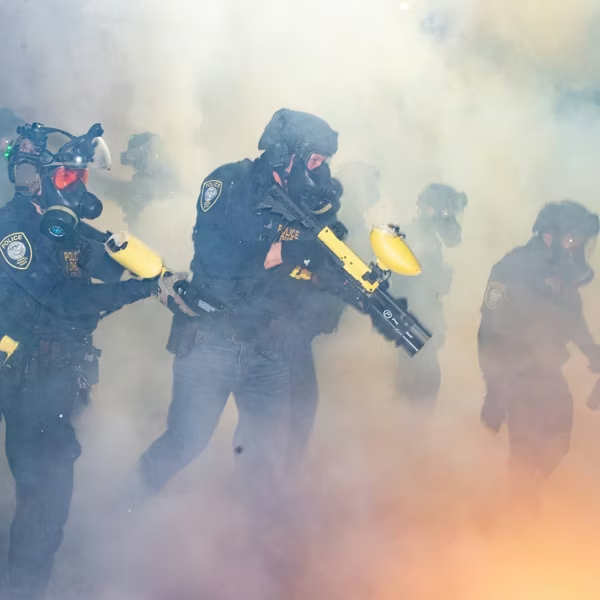Authorities in Cleveland, Ohio, are adding fuel to an already "combustible" atmosphere, some activists say, as the city readies extra jail space and courtrooms and shuts down a local university to house 1,700 riot police and their weapons in preparation for demonstrations at next week's Republican Party convention.
Democracy Now! reported Thursday that city officials "say some courts will be kept open almost 24 hours per day in case protesters are arrested en masse. Authorities have also opened up extra jail space to hold protesters."
The decision to shut down classes at Case Western Reserve University to house riot police drew ire from students and faculty, as one professor described in Belt Magazine:
Imagine my surprise[...] when I learned that not only would CWRU be housing approximately 1,700 riot police in student dormitories during the Republican National Convention, that not only would those police be permitted to store their weapons in student dormitories, and that not only would widespread student opposition to this decision be placated with two milquetoast Q&A sessions--"opportunities to learn," President Barbara Snyder called them--but that my colleagues and I, with only one week's notice, would be expected to cancel a week of summer classes in order to accommodate the quartering of the paramilitary force descending on Cleveland to police the city during the convention.
Adding tension to the situation in Cleveland is the fact that several Black Lives Matter protests last week saw mass arrests and violent behavior from police, leading civil rights groups in Louisiana to sue the Baton Rouge police force for violating demonstrators' First Amendment rights--not to mention the fatal police shootings of two black men in St. Paul and Baton Rouge a week prior.
In Cleveland in particular, there is widespread distrust of the police department that fatally shot 12-year-old Tamir Rice, and then lied about the circumstances of the killing to cover themselves.
Police nationwide have also been on edge since a lone gunman ambushed a peaceful protest in Dallas, killing five officers.
Moreover, it emerged on Thursday that officials from the FBI have been personally contacting civil rights activists associated with the Black Lives Matter movement to warn them that they shouldn't show up at the convention, the Independent reports.
"I think the FBI should be more concerned with investigating and dissuading the known white supremacists and people with ties to known terrorist organizations from attending the convention, versus trying to intimidate people who are speaking out against injustice," said Samuel Sinyangwe, a civil rights activist contacted by the FBI, to the Independent.
The Ohio chapter of the National Lawyers Guild and the Cleveland Branch of the NAACP made similar complaints last month in response to such tactics from local police.
Ratcheting tensions further, presumptive Republican nominee Donald Trump is expected to draw out many passionate supporters of his divisive and racist rhetoric. As Ohio has an "open carry" law allowing the open display of guns, observers expect many convention-goers to be armed.
"Should violence break out during protests in Cleveland, open-carry activists bearing long-gun rifles may distract officers, frighten demonstrators, or inadvertently endanger themselves," CityLab argued.
CityLab also noted that while "Ohio's permissive open-carry laws introduce quite an X-factor into the proceedings[...] so does the Cleveland Police Department's 2015 consent decree with the U.S. Department of Justice, which remains unresolved. Then there is the fact that the RNC is a national and global event on a scale that Cleveland has never seen. (Certainly not in 1936, the last time the city hosted the RNC.)"
Activists are preparing for the worst.
The Boston Globe reported that hundreds of demonstrators "will undergo training to help ensure their safety. Some will don neon green caps and be tasked with documenting--with video--the use of force by police or attacks by other groups."
"Activists are being trained to make sure their hands are always exposed, so it's evident they are not holding weapons, and to clearly articulate if approached by police that they are 'complying, not resisting,'" the newspaper added.
"Some members of Black Lives Matter[...] said they would join [other] marches instead of holding their own event, in part due to safety concerns," the Globe wrote.
Democracy Now! observes that the FBI and local police are also turning their cameras onto protesters: "Authorities, including the FBI, have been monitoring protest groups ahead of the convention and even approaching local activists. Police have also said they will deploy a video unit to document police interactions with demonstrators."
"We want to make it very clear that we are being cooperative," the Rev. Waltrina Middleton, founder of Movement for Black Lives and Cleveland Action, told the Globe.
Middleton "said many local activists are already on edge following home visits by the FBI and other law enforcement inquiring about their plans during the convention. (The FBI has characterized the visits as 'community outreach' aimed at keeping the convention safe)," the Globe noted.
The newspaper added that police "insist they are prepared to keep the peace with ramped-up security plans":
Stephen Loomis, president of the Cleveland Police Patrolmen's Association, said he expects around 3,100 uniformed officers to be on duty, including police coming from out of state, in addition to an undisclosed number of undercover officers.
"We're training for the worst-case scenario. Just over the last few weeks we've really gotten aggressive about it," Loomis said. "We are going to have two very passionate groups of people here on opposite ends of the ideological universe. We are not going to tolerate rocks being thrown, citizens being injured, property being damaged because of a handful of knuckleheads."
Heads of the Department of Homeland Security and the FBI both told reporters that they fear violence from "radical activists" at next week's convention, ABC reported.
"It's a threat we're watching very, very carefully," FBI director James Comey said.



